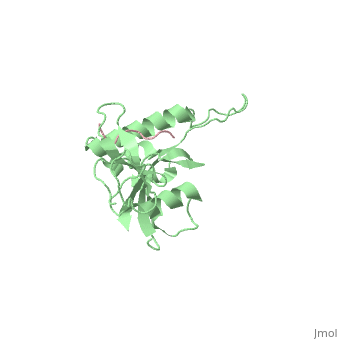We apologize for Proteopedia being slow to respond. For the past two years, a new implementation of Proteopedia has been being built. Soon, it will replace this 18-year old system. All existing content will be moved to the new system at a date that will be announced here.
1f8a
From Proteopedia
(Difference between revisions)
| Line 3: | Line 3: | ||
<StructureSection load='1f8a' size='340' side='right'caption='[[1f8a]], [[Resolution|resolution]] 1.84Å' scene=''> | <StructureSection load='1f8a' size='340' side='right'caption='[[1f8a]], [[Resolution|resolution]] 1.84Å' scene=''> | ||
== Structural highlights == | == Structural highlights == | ||
| - | <table><tr><td colspan='2'>[[1f8a]] is a 2 chain structure. Full crystallographic information is available from [http://oca.weizmann.ac.il/oca-bin/ocashort?id=1F8A OCA]. For a <b>guided tour on the structure components</b> use [https://proteopedia.org/fgij/fg.htm?mol=1F8A FirstGlance]. <br> | + | <table><tr><td colspan='2'>[[1f8a]] is a 2 chain structure with sequence from [https://en.wikipedia.org/wiki/Homo_sapiens Homo sapiens]. Full crystallographic information is available from [http://oca.weizmann.ac.il/oca-bin/ocashort?id=1F8A OCA]. For a <b>guided tour on the structure components</b> use [https://proteopedia.org/fgij/fg.htm?mol=1F8A FirstGlance]. <br> |
| - | </td></tr><tr id=' | + | </td></tr><tr id='method'><td class="sblockLbl"><b>[[Empirical_models|Method:]]</b></td><td class="sblockDat" id="methodDat">X-ray diffraction, [[Resolution|Resolution]] 1.84Å</td></tr> |
| - | <tr id=' | + | <tr id='ligand'><td class="sblockLbl"><b>[[Ligand|Ligands:]]</b></td><td class="sblockDat" id="ligandDat"><scene name='pdbligand=SEP:PHOSPHOSERINE'>SEP</scene></td></tr> |
| - | + | ||
<tr id='resources'><td class="sblockLbl"><b>Resources:</b></td><td class="sblockDat"><span class='plainlinks'>[https://proteopedia.org/fgij/fg.htm?mol=1f8a FirstGlance], [http://oca.weizmann.ac.il/oca-bin/ocaids?id=1f8a OCA], [https://pdbe.org/1f8a PDBe], [https://www.rcsb.org/pdb/explore.do?structureId=1f8a RCSB], [https://www.ebi.ac.uk/pdbsum/1f8a PDBsum], [https://prosat.h-its.org/prosat/prosatexe?pdbcode=1f8a ProSAT]</span></td></tr> | <tr id='resources'><td class="sblockLbl"><b>Resources:</b></td><td class="sblockDat"><span class='plainlinks'>[https://proteopedia.org/fgij/fg.htm?mol=1f8a FirstGlance], [http://oca.weizmann.ac.il/oca-bin/ocaids?id=1f8a OCA], [https://pdbe.org/1f8a PDBe], [https://www.rcsb.org/pdb/explore.do?structureId=1f8a RCSB], [https://www.ebi.ac.uk/pdbsum/1f8a PDBsum], [https://prosat.h-its.org/prosat/prosatexe?pdbcode=1f8a ProSAT]</span></td></tr> | ||
</table> | </table> | ||
== Function == | == Function == | ||
| - | + | [https://www.uniprot.org/uniprot/PIN1_HUMAN PIN1_HUMAN] Essential PPIase that regulates mitosis presumably by interacting with NIMA and attenuating its mitosis-promoting activity. Displays a preference for an acidic residue N-terminal to the isomerized proline bond. Catalyzes pSer/Thr-Pro cis/trans isomerizations. Down-regulates kinase activity of BTK. Can transactivate multiple oncogenes and induce centrosome amplification, chromosome instability and cell transformation. Required for the efficient dephosphorylation and recycling of RAF1 after mitogen activation.<ref>PMID:15664191</ref> <ref>PMID:16644721</ref> <ref>PMID:21497122</ref> | |
== Evolutionary Conservation == | == Evolutionary Conservation == | ||
[[Image:Consurf_key_small.gif|200px|right]] | [[Image:Consurf_key_small.gif|200px|right]] | ||
| Line 21: | Line 20: | ||
</jmol>, as determined by [http://consurfdb.tau.ac.il/ ConSurfDB]. You may read the [[Conservation%2C_Evolutionary|explanation]] of the method and the full data available from [http://bental.tau.ac.il/new_ConSurfDB/main_output.php?pdb_ID=1f8a ConSurf]. | </jmol>, as determined by [http://consurfdb.tau.ac.il/ ConSurfDB]. You may read the [[Conservation%2C_Evolutionary|explanation]] of the method and the full data available from [http://bental.tau.ac.il/new_ConSurfDB/main_output.php?pdb_ID=1f8a ConSurf]. | ||
<div style="clear:both"></div> | <div style="clear:both"></div> | ||
| - | <div style="background-color:#fffaf0;"> | ||
| - | == Publication Abstract from PubMed == | ||
| - | Pin1 contains an N-terminal WW domain and a C-terminal peptidyl-prolyl cis-trans isomerase (PPIase) domain connected by a flexible linker. To address the energetic and structural basis for WW domain recognition of phosphoserine (P.Ser)/phosphothreonine (P. Thr)- proline containing proteins, we report the energetic and structural analysis of a Pin1-phosphopeptide complex. The X-ray crystal structure of Pin1 bound to a doubly phosphorylated peptide (Tyr-P.Ser-Pro-Thr-P.Ser-Pro-Ser) representing a heptad repeat of the RNA polymerase II large subunit's C-terminal domain (CTD), reveals the residues involved in the recognition of a single P.Ser side chain, the rings of two prolines, and the backbone of the CTD peptide. The side chains of neighboring Arg and Ser residues along with a backbone amide contribute to recognition of P.Ser. The lack of widespread conservation of the Arg and Ser residues responsible for P.Ser recognition in the WW domain family suggests that only a subset of WW domains can bind P.Ser-Pro in a similar fashion to that of Pin1. | ||
| - | |||
| - | Structural basis for phosphoserine-proline recognition by group IV WW domains.,Verdecia MA, Bowman ME, Lu KP, Hunter T, Noel JP Nat Struct Biol. 2000 Aug;7(8):639-43. PMID:10932246<ref>PMID:10932246</ref> | ||
| - | |||
| - | From MEDLINE®/PubMed®, a database of the U.S. National Library of Medicine.<br> | ||
| - | </div> | ||
| - | <div class="pdbe-citations 1f8a" style="background-color:#fffaf0;"></div> | ||
==See Also== | ==See Also== | ||
| Line 38: | Line 28: | ||
__TOC__ | __TOC__ | ||
</StructureSection> | </StructureSection> | ||
| + | [[Category: Homo sapiens]] | ||
[[Category: Large Structures]] | [[Category: Large Structures]] | ||
| - | + | [[Category: Bowman ME]] | |
| - | [[Category: Bowman | + | [[Category: Hunter T]] |
| - | [[Category: Hunter | + | [[Category: Lu KP]] |
| - | [[Category: Lu | + | [[Category: Noel JP]] |
| - | [[Category: Noel | + | [[Category: Verdecia MA]] |
| - | [[Category: Verdecia | + | |
| - | + | ||
| - | + | ||
| - | + | ||
| - | + | ||
Revision as of 10:11, 20 March 2024
STRUCTURAL BASIS FOR THE PHOSPHOSERINE-PROLINE RECOGNITION BY GROUP IV WW DOMAINS
| |||||||||||
Categories: Homo sapiens | Large Structures | Bowman ME | Hunter T | Lu KP | Noel JP | Verdecia MA


